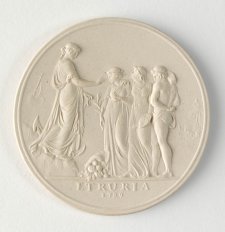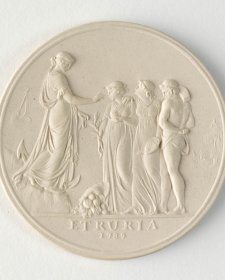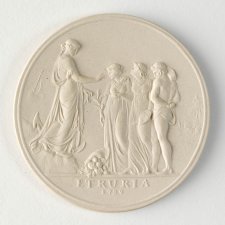Arthur Phillip (1738–1814), first governor of New South Wales, was born in London and educated at the Royal Hospital School, an institution designed to prepare boys for careers at sea. He served a two- year apprenticeship on a whaling vessel before joining the Royal Navy, aged seventeen, in 1755. Phillip saw action in the Mediterranean, the West Indies, South America and Europe and served four years with the Portuguese navy before being given command of a Royal Navy vessel and rising to the rank of post-captain in 1781. Phillip’s varied experience, along with his reliability and knowledge of matters such as farming and convict transportation, are counted among the reasons why, in October 1786, he was given the task of establishing a new colony on the east coast of Australia. The First Fleet sailed from Portsmouth in May 1787 and arrived in Botany Bay in January 1788. Phillip soon after relocated to a cove in Port Jackson, naming the settlement after Lord Sydney, the English politician who had appointed him the colony’s first governor. During Phillip’s governorship, the settlement experienced periods of extreme disquiet and uncertainty and critical shortages of food. Yet he had great hopes for the colony and is noted for his remarkable efforts at establishing peaceful relationships with Sydney’s Indigenous people. Contemporaries described Phillip as a humane, exceedingly honest and diligent man with a warm sense of humour who was progressive in many of his ideas. He returned to England in 1792, but maintained a keen interest in New South Wales. He died in Bath in August 1814, shortly after having been promoted to Admiral.
Painter Francis Wheatley (1747– 1801) was known for his portraits which typically presented his subjects in finely realised landscapes or interiors. His conversation pieces, such as his series of depictions of street vendors titled ‘Cries of London’, exhibited at the Royal Academy between 1792 and 1795, were also highly regarded. This portrait is an engraving of one of Wheatley’s two paintings of Arthur Phillip. The better-known of the two, now in the collection of the National Portrait Gallery, London, shows Phillip in his naval uniform and standing on a beach; while the painting on which this engraving is based shows him holding a document inscribed ‘New South Wales, 1787’. Both portraits are presumed to have been made to mark Phillip’s appointment to the command of the new colony.
Collection: National Portrait Gallery
Purchased 2014



On one level The Companion talks about the most famous and frontline Australians, but on another it tells us about ourselves.



1 January 2015
In recent years I have become fascinated by the so-called Sydney Cove Medallion (1789), a work of art that bridges the 10,000-mile gap between the newly established penal settlement at Port Jackson and the beating heart of Enlightenment England.



Offering portraiture in all its flavours: painting, photography, drawing, textiles, printmaking and sculpture, this exhibition is a feast for minds and eyes.